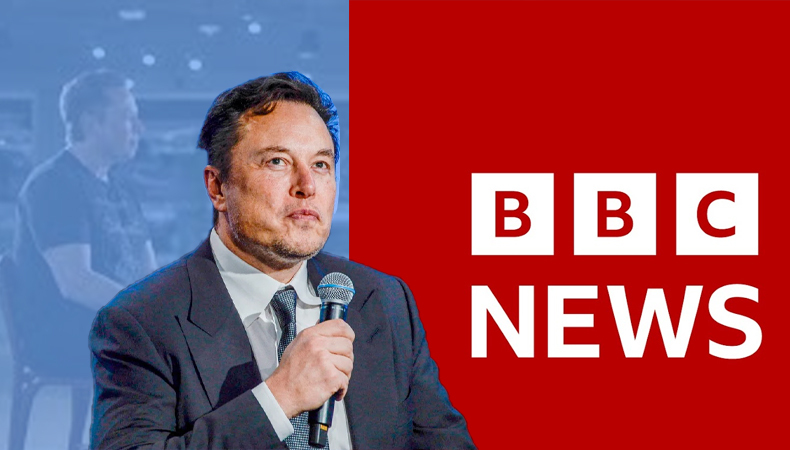BBC vs. Elon Musk

When did the media start being so censorious and illiterate?
Bringing the powerful to justice
So goes the tired cliche about the function of the media, which is that hacks spread like wildfire. However, the opposite seemed to be true in the BBC’s brand-new, blockbuster interview with Twitter founder and the second-richest man in the world, Elon Musk, which was broadcast live on Twitter’s “Spaces” feature this morning. The interview with BBC North American technology reporter James Clayton went so wrong that Musk holding Clayton to the account was one of its most memorable moments. Not without cause, either.
Because Elon Musk claims to want to make Twitter a more free and open forum, he has become a target of the new elite.
The journalist community has been particularly appalled by this. Mainstream journalists have come to the horrifying realization that they are no longer the guardians of information and truth in our populist, social-media age. This is due, in part, to the public’s mistrust of them stoked by their hysterical antics after 2016. They have therefore started demanding that tech companies crack down on undesirables and dissidents in the years following Trump and Brexit. And establishment journalists have gone ballistic ever since Musk purchased Twitter last year, promising to scale back its censorship regime.
The BBC has expressed particular outrage. Several reports by Marianna Spring, the company’s “specialist disinformation and social-media correspondent,” paint Musk’s Twitter as a bigoted hellhole and claim that his amnesty for banned accounts has sparked a tidal wave of “hate.” The Beeb also experienced trouble earlier this week when Twitter decided to tag it on its main account as “government-funded media.” (The BBC prefers the term “publicly funded,” though it may be difficult for the thousands of people who are prosecuted each year for failing to pay the license fee to understand the difference.) Clayton asked Musk for an interview as a result of this ostensibly outrageous provocation, which Musk unexpectedly granted.
Read | The Impact of De-dollarization On The Global Economy And Startups
Clayton picked up where Spring left off, challenging Musk about the alleged proliferation of “hate speech” on his platform during a 90-minute exchange that you can listen to in its entirety here. In a particularly agonizing passage that has since gone viral, Clayton claimed that his feed had overflowed with the substance. Clayton was unable to give Musk even one example of the hate speech he had witnessed despite Musk’s repeated requests. In response to questions, he merely pointed to some slightly sexist’ content he try to read. Then Musk questioned Clayton about whether he believed that content that was deemed to be “slightly sexist” in any way should be prohibited on Twitter. After droning on for a while, Clayton abruptly changed the subject.
On so many levels, this was illuminating. We had a journalist who was so used to promoting The Narrative that he seemed to not know the facts. More significantly, it demonstrated that the corporate media appear unable to define hate speech despite having waged a years-long crusade for social media censorship, particularly against so-called hate speech. Of course, this is because no one can—at least not objectively. One person’s hate speech is another person’s fervent belief.
Because of this, it is extremely risky to give the government or large corporations the authority to define and censor hate speech. Clayton seems to have never considered these ideas because he bristles at all the “slightly” offensive content on his timeline.
His subsequent line of inquiry, which focused on Musk’s alleged inability to control “misinformation,” was yet another outstanding self-own. To deal with any malicious hucksters, Musk claimed that his removal of Twitter bots and a new system allowing tweeters to refute but not remove potentially dubious claims was a far better and more liberal solution. Who has the authority to declare something to be false information? Is this the BBC?” he questioned.
Musk then asked Clayton if he thought the BBC had ever spread untruths, a point Clayton eventually conceded. Musk said he trusted the judgment of users more than the alleged expertise of journalists.
This reverse car crash interview unintentionally exposed the media’s hypocrisy regarding “misinformation.”
Hacks implicitly position themselves as trustworthy, factual sources when they rail against the purported bullshit merchants of the internet, who were reportedly made possible by Musk’s Twitter. However, as the mainstream media have become more politicized, particularly in the wake of populism’s rise, they have repeatedly erred by reporting partisan nonsense instead of straightforward facts. Because of this, the BBC’s climate editor has started saying that deaths caused by climate change are increasing, even though the exact opposite is true. And why, just because they “identify” as women, BBC News insists on referring to violent male criminals as women.
When it comes to his handling of Twitter, Elon Musk needs to be “held to account” for many things. Above all, there are contradictions regarding free speech. Though Musk undoubtedly made Twitter more liberal than it was before he took over, he has nonetheless made several hasty, censorious, and ostensibly self-interested decisions. This is yet another illustration of the need for free speech on the internet to be independent of the whims of the billionaires who control it. Clayton attempted to bring up these hypocrisies, but it fell flat. Why could it? Despite his immense influence, Elon Musk is, at the very least, reluctant to use it to silence those whose opinions he disagrees with. The same cannot be said about our censorious, illiterate media.




